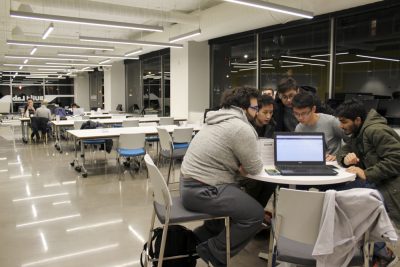
The room bustled with energy as attendees shot their hands up for a chance to have their questions answered by venture capitalist Nitin Pachisia and lawyer Michael Serotte. It was evident that these participants — many of whom were international students and startup founders — were not hesitant when asking for advice that might make their entrepreneurial dreams into realities.
“You are in disadvantage in one aspect: You’re not American,” said Serotte, founding partner at Serotte Law Firm, when addressing the room of hopeful entrepreneurs. “If you’re foreign national, you have some extra barriers.”
Hosted by Innovate@BU, “Immigrant & International Student Entrepreneurs: A Conversation with Unshackled Ventures” welcomed Pachisia and Serotte for a discussion about entrepreneurial opportunities for immigrants and international students living in Boston on Wednesday evening at the BUild Lab.
Unshackled Ventures, founded in 2014 by Manan Mehta and Pachisia, was established to give opportunities to immigrant entrepreneurs to pursue their dreams in America without being thwarted by issues with their visas.
“We started Unshackled about four years ago, coming out of our own experiences as immigrants,” said Pachisia, founding partner at Unshackled. “And the realization was that despite the success of immigrant entrepreneurs, there were no ventures that provided resources specific to the needs of immigrant entrepreneurs.”
Unlike many other startup founders, Pachisia said, immigrants often experience legal difficulties that prevent them from fully devoting themselves to their ventures.
“And those needs are not so much ‘we want to overcome a challenge,’ but it’s more things that just distracts you from focusing on your companies,” he said.
With emphasis on pre-seed capital funding model, Unshackled Ventures utilizes a large community of networks and personalized approaches to fund businesses led by immigrants.
“[We] start with the capital and take away immigration, therefore giving time back to the founders and then connecting them into the ecosystem in an intelligent way,” Pachisia said.
Speed is crucial when creating a successful business, Pachisia said. Unshackled provides the acceleration that immigrants often need when starting their businesses.
“What matters is founder potential. It comes down to what have [you] done off the computer, get in front of the customer and really try to understand customer’s viewpoints, the way they live, the way they work,” Pachisia said. “It’s uncomfortable, but the reality is that it doesn’t go according to your hypothesis.”
Mayank Jaiswal, an organizer of the event and graduate student in BU’s Questrom School of Business, said he hoped Pachisia and Serotte would give immigrant and international entrepreneurs advice with regard to navigating the reality of what it means to start a business abroad.
“The purpose was to discuss the routes available for international and immigrant entrepreneurs to work on finding solutions to the problems of the world while staying in the developed startup ecosystem of the United States, which has so much to offer,” Jaiswal said.
By interacting with someone who’s been in their shoes, Jaiswal said, the event’s organizers hoped students would feel understood and inspired.
“[Pachisia] has been through this journey himself successfully and created [Unshackled] to help entrepreneurs who face the same issue he faced once.”
Harsh Engineer, a graduate student studying energy systems at Northeastern University, said he gained valuable knowledge from Pachisia and Serotte.
“[Investors like Unshackled] are not just simple networking or consulting firms, they are part of your company and they help you out step by step as people in similar positions,” he said.
Pachisia encouraged attendees to begin chasing their dreams immediately.
“We’ve never told anyone ‘you’re too early for us.’ We have said ‘you’re too late,’” Pachisia said. “In the end, you want the speed, you want the trajectory — and we’re here to assist in that process, because after all, we created the company to help people in similar position like we were before”
















































































































